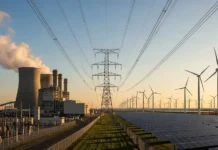The European Union drafted plans in order to wait until 2028 so as to classify hydrogen produced by nuclear as a low-carbon fuel, thereby risking kneecapping the market when it comes to nascent energy sources, the nuclear industry in Europe has said.
The European Commission is drafting EU benchmarks for what kind of hydrogen will be designated as low-carbon fuel, which is a certification aimed so as to build up a market for the very nascent green energy source.
A draft of those rules, according to the commission, will by July 2028 go on to assist a classification for nuclear based hydrogen development, thereby meaning that a hydrogen producer has gone on to sign a power purchase agreement with a nuclear plant.
Brussels is going to start consulting on the nuclear rules by June 2026, the draft has added.
The industry group, Nuclear Europe, whose director general, Emanuel Brutin, has gone on to say that this timeline will indeed hamper the nuclear based hydrogen development as compared to other types of the fuel.
In a statement, he said that this kind of unjustified three-year delay goes on to give a very unfair competitive advantage to hydrogen produced by way of renewables.
The EU went on to pass the rules in 2023 by confirming how hydrogen produced by way of renewable energy can count in Europe’s green goals.
It is well to be noted that EU nations are at odds when it comes to nuclear power’s role. As far as Europe’s energy transition and political clashes are concerned in connection with the fact that the issues have gone on to stall negotiations on many EU policies in the years that have gone by.
Interestingly, the pro-nuclear countries such as Poland, France, and Sweden have said that Brussels should do more in order to recognize nuclear power. Other countries, such as Denmark and Germany, have opposed mixing nuclear into certain green policies, which, according to them, could distract from the massive expansion as far as wind and solar are concerned, which are needed to meet climate goals.
Apparently, nuclear energy does not produce any kind of carbon dioxide emissions, but it is not an unabated source of energy, such as solar or wind. Proponents go on to cite that nuclear reactors have the capacity to come up with base load power in spite of weather conditions such as wind or sunshine.
On the other hand, opponents raise issues such as the disposal of radioactive waste.
It is worth noting that most of the hydrogen that is consumed by European industries today happens to be produced by way of fossil fuels. The EU looks forward to gradually replacing this part with hydrogen produced by way of emission-free energy. The EU countries’ experts have already discussed the draft proposal by the European Union on May 15.
As per the European Commission’s spokesperson, they are indeed committed to looking out for a balanced solution that works for all member states and also clarifies the rules of the numerous hydrogen pathways that are available.










































